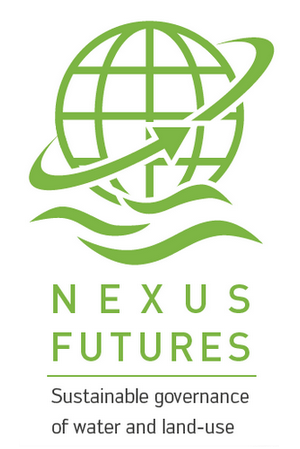About the project
Water governance poses a particular challenge that is slowly becoming more obvious in a growing number of regions across and beyond Europe.[1] Systems thinkers are regularly pointing out that we are trapped in a vicious cycle of financing grey infrastructure for water treatment and distribution, over extraction, degradation of the natural regeneration and retention capacity, and thus greater dependency on energy and capital intensive approaches to access water, leading to further investments in grey infrastructure. Nature-based solutions, including community-based governance approaches of natural resources systems are increasingly receiving attention from experts as more sustainable solutions, but are still far away from the main-stream.[2]
The NEXUS FUTURES project consists of three complementary research areas:
Collaborative conceptual systems mapping in two river basins
This part of the project includes interviews, workshops and other participatory approaches carried out in close collaboration with two river partnerships (Upper Sûre and Syr). The aim is to better understand systemic interdependencies and opportunities for transformation of the way actors engage with water and soil. Moreover, participants are encouraged to propose new sustainability initiatives.
Scenarios for sustainable engagement with water and soil in Luxembourg
The aim of this work strand is to identify and deliberate in a structured manner about possible future challenges in how we engage with water and soil in Luxembourg. Building on workshops and interviews in the years 2018 and 2019, a set of three scenarios are currently being prepared which provide plausible and challenging accounts of very different possible development pathways leading to the year 2045. The scenario set will provide an innovative tool to take account of open futures in decisions today, which will be available to all public, private and civil society organizations in Luxembourg from 2020.
Citizen Science for sustainable use of water
This part of the project offers concerned and interested parties the opportunity to participate actively in water conservation, environmental monitoring and science. The tool will also be designed for being used in conjunction with educational activities in formal, non-formal and informal settings. A Citizen Science Tool is currently being developed through a co-design process that will allow volunteers to observe, document and contribute to a public database of commonly selected aspects of the water-environment-human system. In todays networked knowledge society, new ways of generating knowledge are best complemented through actual exchange and experience in the environment.
The NEXUS FUTURES project is funded by the Ministère de L’Environnement, du Climat et du Développement Durable (MECDD) and the University of Luxembourg. Further information about the National Scenarios, the cooperation with the river partnerships of the Upper Sûre and Syr, as well as the Citizen Science project can be found below.
[1] http://www.eib.org/en/infocentre/publications/all/a-watertight-solution.htm
[2] https://www.unwater.org/publications/world-water-development-report-2018

